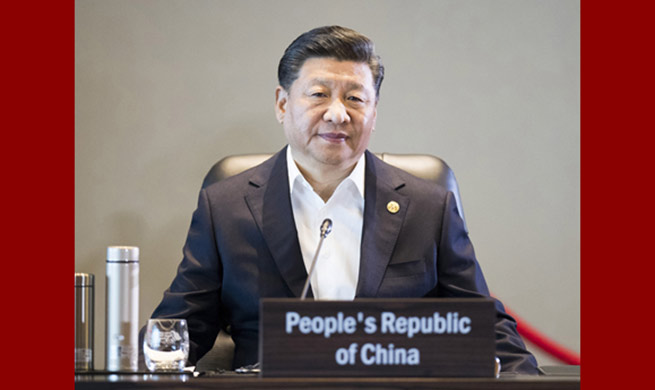ROME, Nov. 21 (Xinhua) -- The Italian government appeared defiant towards the European Union (EU) on Wednesday, in the same day that Brussels warned a disciplinary procedure for excessive deficit would be open against the country due to its 2019 draft budget.
"The government is certain about the validity of the budget structure," Ansa news agency quoted Italian Prime Minister Giuseppe Conte as saying.
Speaking with reporters in parliament, Conte explained he was waiting to meet EU Commission President Jean-Claude Juncker to fully address the problem.
"I will see Juncker on Saturday evening, and we will have the chance to extensively discuss the issue," the prime minister said.
However, he stated his populist coalition government remained positive that the budget was "in the interest of Italy and of Europe as well," Ansa reported.
Later on Facebook, the prime minister added that his government was "ready to a constructive dialogue with the European Commission".
"I will bring with me to Brussels a detailed plan of our reforms, and with particular regard to our plan for material and immaterial infrastructures."
Another reaction came from deputy Prime Minister and Interior Minister Matteo Salvini, who is the leader of right-wing governing League. He argued on Facebook that Italy pays more than what it receives from the EU each year.
Indeed, Italy contributed 12 billion euros to the EU budget and received 9.7 billion in 2017, according to EU statistics. In 2016, it contributed 13.9 billion euros, while the EU spending on the country was 11.5 billion.
Salvini also dismissed some media reports suggesting he was ready to review the budget, and instead confirmed the deficit target of 2.4 percent of gross domestic product (GDP) -- as foreseen in the controversial draft -- was not to be discussed.
The EU Commission's announcement of disciplinary procedure on Wednesday did not really come as unexpected for the Italian government, based on a coalition between Salvini's League and populist Five Star Movement.
As requested to all countries in the bloc, Italy firstly presented its national draft budget to the EU on Oct. 16. The EU Commission on Oct. 23 warned the draft showed "a particularly serious non-compliance" and, with an unprecedented move, rejected the plan.
Rome then presented a slightly revised draft on Nov. 13, with minor adjustments but no changes in key economic and fiscal targets.
Overall, the draft budget was outlined in order to deliver major promises made by the two governing parties in the campaign ahead of March elections: most of all, a universal income, a rollback from a 2011 pension reform that increased retirement age, and a rise in public spending to revamp economy.
As a result, the cabinet put the deficit at 2.4 percent of GDP in 2019, and at 2.1 percent in 2020.
Authorities in Brussels said Rome's growth projections were too optimistic, and forecast Italy's deficit would reach 2.9 percent in 2019, and 3.1 percent in 2020, which would be beyond the 3.0 percent EU ceiling.
This would impact negatively on the sustainability of Italy's public finances, according to Brussels. EU fiscal rules in fact demand a reduction of public debt from each member country, if above 60 percent of GDP.
Italy's debt was 131 percent of GDP in 2017, the second largest ratio within the bloc after Greece (1 euro = 1.14 U.S. dollars).













